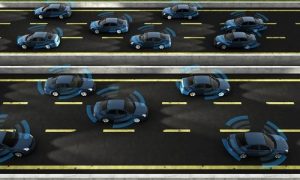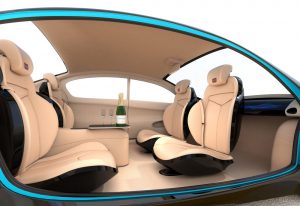When most people think about cars, they have an associated memory, possibly from their childhood or more recently, when they purchased something that they had been saving up for a while. Cars have always been personal, to the majority of people. It’s currently one of the biggest purchases that one will have to make in their lifetime, and it’s something that most will have to live with for a good chunk of time. It’s kind of like a household pet, one chooses the best fit for them, which will hopefully make things easier and bring them joy knowing that it’s theirs. However, what if that all was to change? 
Until very recently, the thought of autonomous or self-driving vehicles was considered far-fetched. Even dating back generations, looking at depictions of the future through pop-culture, flying cars were given more merit than self-driving cars. Currently, this is a highly controversial topic, but it is very real. To see just how serious things are becoming and how soon change might happen, let’s look at the recent history of autonomous vehicle research and how that might have an effect on
the luxury of choice when purchasing a vehicle.
Some form of autonomy has existed since the 1500s when Leonardo Da Vinci graced this planet with his unmatched curiosity and innovation by setting a foundation for future creators to thrive. Fast-forward to the 1930s when initial versions of autopilot in aviation were invented and you will see that autonomous technology has been with us for quite some time. In between that time and the early 2000s there were different technologies, from cruise control to robotic technology driven by cameras, that have helped in creating what is being crafted now for self driving vehicles. Also, the DARPA competition was a huge propellant in the self driving technologies development. Fast-forward today, and you have a full force project with different organizations at all levels working together to make this once distant idea a concrete reality.
The concentrated effort to develop autonomous vehicles first started with Google; and companies have been quick to jump on the ship of creation – from Tesla and Uber, to long-time car giants like GM and Ford, everybody is in a race to be the first to make this a reality. Also, developments are being made through governments
and legal teams. One might wonder, which one of these billion dollar companies will reign supreme in the end, but there has to be confidence in this futuristic technology
given all of these giant companies are in a battle of innovation with the support of local, state, and federal agencies and governments.
It should be adopted by now, that this technology is very real, and will most likely be here very soon. The bigger question, is how will self-driving vehicles be used, and to what extent will they be used. What types of legalities will be put on the use of self-driving cars, and how much responsibility will the consumer have compared to the suppliers, insurers, banks, etc. Will ownership of a vehicle still be required, or will that, in some sense be eradicated. Before, touching on some of 
those questions, a quick peek into how some of these technologies work should be examined.
One of the most prominent technologies being used in autonomous cars is LIDAR, which stands for Light Detection and Ranging. LIDAR is essentially a sensing device controlled by laser pulses, which detects distances to physical structures/objects like the earth’s surface or trees and barriers. Other companies are focusing more on camera sensing devices rather than light. Both technologies will produce the same function for the vehicles in the grand scheme of things and will act as “eyes” that will relay information to the central network (CPU) to make decisions and adjustments based on the environment. The development and choices made by the companies currently researching autonomy in vehicles will be largely dependent on the scale of autonomy replacing human control on the road.
This is where individuality in cars may be diminished. Elon Musk, the CEO and owner of Tesla and SpaceX, as well as ex-owner and founder of PayPal, has had interesting ideas of the future to say the least. You may have recently heard of his venture into space with his “autonomous” rockets ‘Falcon Heavy’ that safely returned to earth after launching his Tesla Roadster into space, which became a part of the solar system. Some say, that this is the first truly autonomous vehicle, as it
will never need charging, steering, or any extra control outside of the path it’s already on. Regardless, it was a big step for space exploration, but also makes self driving
vehicles on the earth seem that much more realistic.
Some of Musks’ grand ideas are to have full autonomy replace what we all know today on the road. He pictures a world, where vehicles will be used for personal traveling, as well as public transportation. He believes that owning a vehicle will not only be unnecessary, but an optional luxury that can be used as a resource to work for you and make money for you, when not in use. Imagine parking garages in every town and city, large and small. The idea is that, a vehicle will come pick you up when you need it and take you where you need to go and then return to its designated garage.
Most vehicles would then become personal taxis, that you can either decide to fully own to create your own profits, or just use to get around when you need it.
This would be considered a full scale rollout of autonomous vehicles, which would not be limited to personal cars, trucks, and vans, but also commercial vehicles like
semi-trucks, buses, and quite possibly over-the-top party-themed super-limos. That last one may be a personal request, rather than a reality, but maybe someone could
pass that on to Musk.
It’s quite terrifying actually, and there’s still a lot to be learned and discussed throughout this boom in car technology, plus there is so much more information out there on this very topic that was not covered in this piece. Ultimately, driverless vehicles are being developed to improve safety and increase mobility for everyone and everything, but there are considerations that need to be accounted for. What happens during an accident and who takes responsibility for that? Should full automation
be rolled out at all, or should there still be a human element in charge behind the wheel? These things need to be talked about and passed onwards and upwards to the companies on the forefront of this movement.
However, the biggest concern, which is a definite possibility, is the loss of customization in vehicles. Will all cars become a cookie-cutter version without the option of individuality, which is used more as a resource than a way of expressing oneself? Will there still be choice in color and body styles as well as adding aftermarket
products to improve your vehicle, how you want to? What happens to the memories people have of getting their drivers license and driving a car for the first time on their own? These may be small sacrifices considering the overall improvement of transportation through autonomy, but it is curious if one day, driving a vehicle will be considered more of a luxury than a chore. There is a lot here, so please feel free to comment on or share this article with anyone you want, to create an active discussion around this topic, cars, and life in general. Hope to see you back soon!
